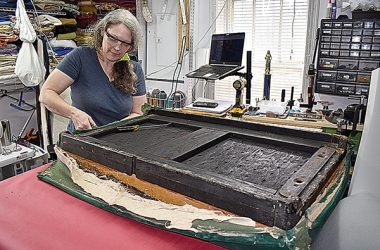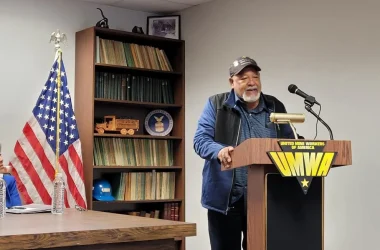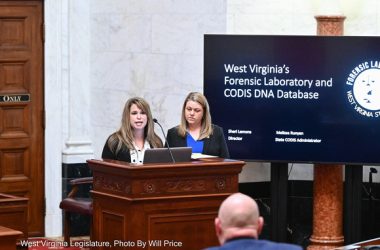By CARLEE LAMMERS
Charleston Gazette-Mail
CHARLESTON, W.Va. — A recently published legislative audit calls for the state to terminate its funeral service board and place the board’s regulatory function under another health-related agency.
The audit comes after the board’s decision to only temporarily suspend the license of Chad Harding, a Putnam County funeral home owner who cashed in more than 100 prearranged funeral plans for people who hadn’t died.
John Sylvia, director of the Performance Evaluation and Research Division, wrote in the report that “the board acted to protect the interest of one of its licensees more than the safety of the public” throughout the Harding case.
A federal judge ordered Harding last year to pay nearly $3 million to an Iowa-based insurance company for selling and cashing in on preneed funeral arrangements for more than 100 people who weren’t dead. Harding was ordered by Chief U.S. District Judge Robert C. Chambers to pay three times the amount he and his wife, Billie Harding, bilked from Homesteaders Life Insurance Co.
In December 2016, lawyers for the insurance company filed notice that the judgment against the Hardings had been “sold, transferred and assigned” from Homesteaders Life Insurance Co. to Clay Holding Co. LLC of Belle.
In other words, the Hardings no longer owed the insurance company $2.8 million, but area businessman Tommy Clay was to be reimbursed for the judgment, according to a previous Gazette-Mail report.
In the audit, Sylvia wrote that the board has sufficient authority to timely address fraudulent activities of its licensees.
“The board has the authority to act appropriately and in a timely manner when it becomes aware that a violation has occurred by a licensee and a risk is posed to the public,” Slyvia wrote, referring to state code. “The board is required to act first and foremost in the interest of the public…’
The audit also found the board failed to exercise its authority in the case for 13 months after it became aware of Harding’s fraudulent activities, and waited an additional 10 months before suspending his license.
The board first learned of the matter in August 2015, when it obtained a copy of the life insurance company’s complaint filed in federal court. The board was also aware of the state attorney general’s court injunction to permanently disallow Harding to sell preneed funeral contracts in West Virginia in September 2015.
The board first began discussing the matter in March 2016, according to the audit report. At that time the board’s attorney told members it could not take disciplinary action against Harding without a complaint setting forth a violation of the funeral services laws.
“However, as cited previously, West Virginia Code allows licensing boards to suspend a license prior to a hearing if the licensee constitutes an immediate threat to the public,” Sylvia wrote. “In the case of Mr. Harding, the board did not exercise that authority.”
In April 2017, the board scheduled a July 25 disciplinary hearing for Harding. The board’s attorney sent out subpoenas to Harding, a representative from the life insurance company and the attorney general’s preneed auditor to serve as witnesses in the hearing. The hearing was set to be open to the public.
On July 11, a board staff member contacted the Secretary of State’s office, requesting an emergency meeting to discuss a settlement in the case, the report said. The emergency meeting was held July 14.
However, the audit found that the board’s “emergency meeting does not appear to meet the ethics commission’s definition for an ‘emergency meeting.’”
Emergency meetings typically “involve an unexpected situation or sudden occurrence of a serious nature, such as an event that threatens public health or safety,” Sylvia wrote in the report. “Since April 2017, the board had been planning on conducting its disciplinary hearing for Mr. Harding on July 25, 2017. The board had taken the time and effort to subpoena witnesses and appoint a hearing examiner for the hearing. … It is not clear what adverse consequences could have occurred by maintaining the original scheduled July 25, 2017 disciplinary hearing.”
At the emergency meeting, board members voted to forgo the disciplinary hearing, and accept a settlement proposal.
The board suspended Harding’s funeral director license for six months and allowed him to keep his embalming license, according to current and former board members and one of Harding’s attorneys. In West Virginia, the two licenses are usually combined under a dual funeral-service license.
After the six-month suspension of his funeral director license, Harding will spend six months on probation.
In the days following the decision, three board members resigned from their positions. The remaining four members had all been recently appointed to the board by Gov. Jim Justice, with terms beginning on July 1.
Sylvia also wrote that the board “has a history of untimely and lenient responses to fraudulent activities of licensees.”
The report cited three specific instances where the board neglected to use its authority to protect the public or accommodated the licensee accused of fraudulent activity.
In the three cited instances, Sylvia wrote the board either delayed action, took improper action or took no action “potentially placing the public at risk.”
“Ultimately, it is the opinion of the Legislative Auditor that the board chose to give preference to the licensee rather than the interest of the public,” Sylvia wrote. “Consumers of funeral services and goods are often in a distraught emotional state when making these high-cost transactions. The evidence demonstrates a relatively high risk of dishonest business practices by unprofessional funeral service providers.”
The audit suggests the Legislature should terminate the board, and place its regulatory function under another agency, such as the Department of Health and Human Resources’ Bureau for Public Health.
If termination is not implemented, the audit suggests the board be reconstituted, and all current members should be replaced with new ones.
The auditor also suggested placing two citizen members on the board. Currently there is only one citizen member.
In a four-page response to the audit, Regina Anderson, executive director of the board, said the board has been “chastised” for its actions.
“It has been the advice of previous attorneys assigned to the board that in matters involving criminal actions that we should wait for a conviction and then proceed to suspend the license,” she wrote. “We now find ourselves being chastised for failing to act according to the interpretations of your attorneys when our attorneys have advised to the contrary.”
Sally Attilli, the recently elected board president, told committee members Sunday that the new board members were “limited” when it came to make a decision in the case.
Attilli said the previous board considered terminating Hardings license, but the board and its attorney deemed it was “not necessary.”
“That was decided that was not necessary because the Attorney General had revoked his license to sell preneeds, as well as taking special actions to audit preneeds,” she said.
Ronald A. McVey, one of the new members, told members of the committee Sunday that the board still stands behind its decision to only temporarily suspend Harding’s license.
Anderson also wrote that the board sent the Secretary of State’s office a request for a July 14 “special meeting”; ”however, we received a call from that office stating that there were no more special meeting notices and the notice appeared as an emergency notice.”
Anderson said the new members had “limited input in the Harding decision,” as their terms had just began days before the settlement was agreed upon.
Anderson also noted that all three board members who resigned had “close ties” to the West Virginia Funeral Directors Association, a lobbying group that allegedly “inappropriately” contacted new members attempting to sway their vote on the Harding matter.
“As the past board acted in accordance with its attorney’s advice and guidance,” Anderson wrote, “the board feels that it has been unfairly criticized regarding how this case was handled.”
In his response to the committee Sunday, Robert Kimes, the director of the state Funeral Directors Association, said his group believes the auditors did an “excellent job identifying the West Virginia Board of Funeral Examiners’ failures to act prudently and in a timely manner.”
Kimes called for a “complete overhaul” of the current board and said his organization denies any claims of inappropriate — or any — contact to current board members.
Last month Harding was suspended from providing transport services to the West Virginia Office of the Chief Medical Examiner, according to a previous Gazette-Mail report.
In a letter addressed to Harding, the state Department of Health and Human Resources, Bureau for Public Health and Chief Medical Examiner’s Office said each of Harding’s businesses no longer is “approved and authorized” to provide services because of a “potential breach of confidentiality.”
That investigation is ongoing.
Reach Carlee Lammers at [email protected], 304-348-1230 or follow @CarleeLammers on Twitter.
See more from the Charleston Gazette-Mail




